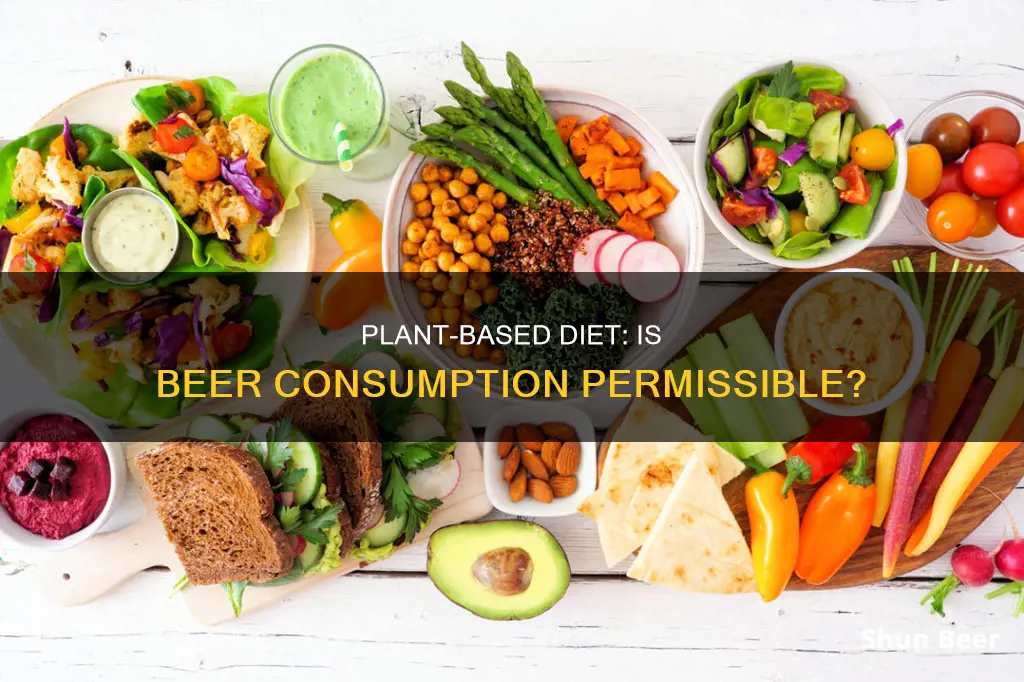
Beer is often assumed to be vegan-friendly, but this is not always the case. While beer is typically made from wheat or barley, yeast, hops, and water, animal products are sometimes used during the brewing process. These animal-derived products, such as gelatin or isinglass, are added during the fining process to ensure the beer is smooth and clear. Some brewers also add honey to their beer, making it non-vegan. However, many beers are vegan-friendly, with brewers using moss as a fining agent. It is important for strict vegans to carefully check the ingredients or opt for beers that are known to be vegan.
| Characteristics | Values |
|---|---|
| Beer on a plant-based diet | Beer often contains animal products, but some brewers use moss as a fining agent, making it suitable for a plant-based diet. |
What You'll Learn
- Beer is often not vegan-friendly due to animal products used in the fining process
- Some brewers use moss as a fining agent, making their beer vegan-friendly
- Brewers may also use honey or milk sugar in their beer, making it unsuitable for strict vegans
- Beer can be part of a healthy plant-based diet when consumed in moderation
- Red wine is generally considered more vegan-friendly than beer

Beer is often not vegan-friendly due to animal products used in the fining process
Isinglass, for example, is a fining agent made from the dried swim bladders of fish and is commonly used in beer filtration. Similarly, gelatin, made from boiled animal bones, flesh, and ligaments, may also be used. Casein, a protein derived from cow's milk, and albumin, derived from egg whites, are other animal-derived products that may be used in the fining process. These animal-based fining agents can leave trace amounts of animal products in the beer, making it non-vegan.
It is important to note that not all beers are non-vegan due to the fining process. Some brewers may use alternative fining agents that are suitable for vegans, such as moss, pea protein, or carrageenan derived from Irish moss. Additionally, some modern craft beers may settle naturally, eliminating the need for any additional filtration agent. However, it is always a good idea to check the ingredients or consult resources specifically designed to help identify vegan-friendly alcoholic beverages.
Non-Alcoholic Beer and Minors: What's the Verdict?
You may want to see also

Some brewers use moss as a fining agent, making their beer vegan-friendly
Beer is not always vegan-friendly. Animal products are sometimes used in the brewing process, particularly during the fining process. Fining is used to filter the beer and ensure it is clear, fresh, and smooth. It can also get rid of any unwanted textures, aromas, and flavours caused by the sediment.
However, some brewers use moss as a fining agent, making their beer suitable for those on a plant-based diet. Moss is added to the beer during the boil. Moss is a positively charged molecule, and as opposites attract, it attaches to negatively charged particles and sinks to the bottom of the kettle or fermenter. This process does not affect the flavour of the beer.
Moss is not the only vegan-friendly fining agent. Others include pea gelatine, silica gel, silica clay, and kaolin (clay mineral).
Beer and Ear Infections: Is It Safe to Drink?
You may want to see also

Brewers may also use honey or milk sugar in their beer, making it unsuitable for strict vegans
Beer is often considered to be plant-based because its main ingredients are wheat or grain, yeast, hops, and water. However, beer is not always vegan-friendly. Brewers sometimes add animal products during the fining process, which is when fining agents are added to the beer to remove molecules that cause cloudiness and create a smooth, clear appearance. These fining agents can include animal products such as gelatin or isinglass (a substance derived from fish bladders). Honey and milk sugar are also sometimes added to beer, making it unsuitable for strict vegans.
Honey is not vegan because it is made by bees for bees, and its production and consumption harm bees and disrupt their ecosystems. Bees make honey by collecting the nectar of flowers and taking it back to their hive, where they use their mouths to pass it around to other bees until it is eventually stored in a honeycomb. This process helps pollinate plants and is an essential part of the bees' diet. When people harvest honey, they often take more than bees can spare, leaving them without enough food to survive. Additionally, the process of commercial beekeeping can harm bees, as it often involves transporting them long distances, exposing them to pesticides, and feeding them unnatural diets.
Milk sugar, also known as lactose, is also not vegan. Lactose is a natural sugar found in milk and other dairy products. To obtain milk sugar for use in beer or other products, it must be extracted from milk. This process involves separating the milk into its individual components, including lactose, proteins, and fats. This extraction process means that milk sugar is not vegan, as it is derived from an animal product.
Some brewers may use alternative fining agents that are suitable for vegans, such as moss. These beers would be considered plant-based and suitable for vegans. However, it is important to check the ingredients or do additional research to ensure that the beer does not contain any animal products.
Beer and Wheat Allergies: Is Drinking Safe?
You may want to see also

Beer can be part of a healthy plant-based diet when consumed in moderation
It is important to note that not all beers are vegan-friendly, as some may contain animal products such as honey or be processed using ingredients like isinglass, egg whites, or gelatin. However, there are many vegan beer options available, including popular brands such as Budweiser, Coors, Corona, and Miller Lite. These beers are typically processed using vegan-friendly fining agents, such as moss or pea protein.
When consuming beer as part of a plant-based diet, it is crucial to practice moderation. Excessive alcohol consumption can have detrimental effects on health and well-being. According to Dr. Peter Attia, it is advisable to limit alcohol intake to no more than three days a week and no more than two drinks per day. Additionally, it is recommended to avoid drinking within three hours of bedtime to minimize potential disruptions to sleep.
In conclusion, beer can be a part of a healthy plant-based diet when consumed in moderation and when vegan-friendly options are chosen. Enjoying an occasional beer can enhance some beautiful moments, but it is essential to be mindful of the potential risks associated with excessive alcohol consumption.
Beer Drinking and Diabetes: Is There a Link?
You may want to see also

Red wine is generally considered more vegan-friendly than beer
While it is possible to drink beer on a plant-based diet, it is important to be cautious. Beer is often made using animal products during the fining process, which removes molecules such as phenolics, tartrates, and tannins, resulting in a clearer and smoother beverage. These animal products can include gelatin, isinglass (made from fish swim bladders), chitin (crustacean shell polymer), and egg whites. While the fining agents are removed, traces of animal products may remain, making some beers unsuitable for those on a plant-based diet.
Red wine, on the other hand, is generally considered more vegan-friendly. While some wines do contain animal products, many are suitable for vegans and plant-based diets. The fining process for wine can also use animal products, but there are alternative methods that utilise clay or clay minerals, such as silica gel or kaolin. Additionally, wine is made from grapes and yeast, and some wines are certified organic, containing higher levels of antioxidants like resveratrol. Resveratrol is known for its anti-ageing properties and potential health benefits, including cancer protection.
It is worth noting that alcohol consumption, regardless of the type, has been linked to various health issues. Excessive drinking is associated with an increased risk of heart disease, liver disease, cancer, and other negative health impacts. Therefore, it is generally recommended to limit alcohol intake or consume it in moderation.
Beer and Sneezing: Is There a Connection?
You may want to see also
Frequently asked questions
Beer is typically made from wheat or barley, yeast, hops and water, so it may seem like an obvious choice for a plant-based diet. However, some beers are processed using animal products such as gelatin, honey or isinglass, which is made from fish bladders. If you are on a plant-based diet, you will need to be careful to choose beers that are free from animal products.
Beer manufacturers are not required to list ingredients on their labels, so it can be difficult to know if a beer is suitable for a plant-based diet. You can use online resources such as Barnivore to check the vegan status of popular beers. Alternatively, look for beers that use moss as a fining agent, as this is a natural plant-based product.
Yes, most hard liquors such as bourbon, whiskey, vodka, gin and rum are vegan-friendly. However, you should avoid cream-based liqueurs and products that contain honey.
Moderate alcohol consumption can have some health benefits, such as a reduced risk of heart disease and improved mental health. However, excessive drinking can have severe negative consequences, including an increased risk of cancer, liver disease and mental health issues. It is important to drink in moderation and be aware of the risks associated with alcohol consumption.







